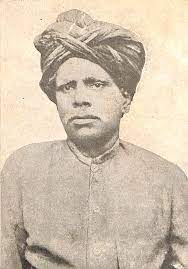Sri Kandukuri Veeresalingam is considered the father of Renaissance in Andhra Pradesh. He was not only a literary figure but also a social reformer. He awakened the masses out of their medieval orthodox customs and superstitions. He was a multifaceted personality whose literary and revolutionary activities left an indelible mark on Andhra society.
Rao Bahadur Kandukuri Veeresalingam Pantulu was born on 16 April 1848 at Rajahmundry, Andhra Pradesh. Veersalingam was born to an orthodox Brahmin family as the son of Subbarayudu and Poornamma. Unfortunately, he lost his father when he was just four years old. His paternal uncle raised him, and through his support, Veeresalingam studied in local schools. His zeal to learn earned him academic accolades at a young age.
With constant support from his mother and uncle, Veeresalingam finished his matriculation in 1869. He then worked as a schoolteacher in Korangi Village, Andhra Pradesh. Later, he got married to Rajyalakshmi.
Veeresalingam used literature as a tool to banish the darkness of superstition and social vices, and spread awareness. He adopted a simple, lucid, and straightforward style of writing. He was the first writer to pen a Telugu novel. In 1880, his novel titled “Rajasekhara Charitramu” was published.
Veeresalingam is also credited with introducing essays and autobiography into Telugu literature. His autobiography, “Sweeyacharitha,” was the first autobiography written in Telugu. He also composed several plays in Telugu. Through his plays, he addressed the social evils of his time.
In 1880, Veeresalingam wrote ‘Vyavahara Dharmabodhini’. This became the first staged Telugu drama. In the same year, he wrote ‘Bramha Vivaham’ which ridiculed the opposers of women’s education through satire. He also penned ‘Satyaraja Poorvadesayatralu’, a satirical piece on male dominance in society.
Hailing from a Brahmin family, Veeresalingam never hesitated to criticise the upper-class attitude of Brahmins in society. Some of his plays portrayed the attitude of Bramhin priests and Bramhins in power. Among his notable works are “Viveka Deepika” in 1880, “Prahlada” in 1885, “Satya Harischandra” in 1886, and “Tiryag- Vidvan Mahasabha” in 1889.
Veeresalingam translated several prominent works into Telugu. His valuable translations include primarily from Sanskrit and English. He enabled the typical Telugu reader to access prominent Sanskrit and English works through his translations.
Apart from being an exceptional writer, Veeresalingam was also a progressive social reformer. He was heavily influenced by the ideas and activities of “Bramha Samaj”. He greatly respected thinkers such as Atmuri Lakshmi Narasimham, district munsif of Rajahmundry and a staunch critic of caste system, and Keshav Chandra Sen, philosopher and social reformer. He ardently supported women’s education. In 1874, Veeresalingam opened a girls school in Dhavaleshwaram. In 1884, he opened another girls school in Innisipeta, Rajahmundry. Besides supporting women’s education, he took time to educate his wife, Rajyalakshmi.
In 1876, Veeresalingam started a monthly magazine called “Vivekavardhini”. Through this magazine, he fearlessly exposed the corrupt practices of government officials. He wrote several articles on ‘the importance of women’s education ’ and ‘evils of child marriage’. In 1873, Veeresalingam penned “Stree Vidhya” a collection os poems. In stree Vidhya he maintains strong stance on women’s education.
Apart from these, he ardently criticised superstitious beliefs. He also launched “Sahithabodhini” to advocate for widow remarriage and women’s education.
Veeresalingam was heavily moved by societal norms and practices that denied women several opportunities. He was the torch bearer for the widow’s remarriage movement in Andhra Pradesh. In 1879, Veeresalingam delivered a speech on widow’s remarriage. This speech created a sensation throughout Andhra Pradesh. Many upper-caste members vehemently criticised him for his stance on widow’s remarriage.
In 1910, he published “Athibalya vivaham”, a commentary on child marriage. In that Veeresalingam writes “These child marriages have been prevalent in our country for a very long time. But the question arises, what is the necessity of this practice in today’s world? Why should young girls and boys be forced into a marriage at such a young age? The injustices related to marriage are not just limited to the poor, it’s widespread. It’s time to rethink and break this cycle.
We should ensure that our children have a good education and lead a life full of happiness and fulfillment rather than being burdened with the responsibilities of marriage at such a tender age. We need to stop these injustices and stand up for what is right. It’s high time that we put an end to child marriages, whether among the rich or the poor.”
The plight of young widowed women influenced Veersealingam. He believed that young women can lead a joyful life after remarriage. Despite the strong opposition from orthodoxy, Veeresalingam conducted the first widow remarriage in Andhra Pradesh on December 11, 1881.
In India, this news quickly spread across different parts of the country, and many imminent social reformers appreciated his efforts. In 1898, MG Ranade, in a meeting, acclaimed Veeresalingam as “Iswar Chandra Vidyasagar of South”. He went on to deliver several lectures on widow’s remarriage. He often cited Shlokas from ancient Hindu scriptures to educate people that Hindu dharma didn’t forbid widow’s remarriage.
Sri Kandukuri Veeresalingam Panthulu dedicated his whole life to eradicating the social injustice against women. As a literary icon, he fearlessly attacked the prevailing social evils through his plays, journals, and magazines. As a social reformer, he inspired people to think and act progressively. He laid the foundation of a modern Andhra society with the significant reforms he brought during his time.
References
- https://amritmahotsav.nic.in/district-reopsitory-detail.htm?3788
- https://indianculture.gov.in/node/2833251
- Rani, S. (2012). Women’s worlds in the novels of Kandukuri and Gilman. CLCWeb,14(2). https://doi.org/10.7771/1481-4374.1963
- Uma, A., & Sridhar, M. (2021). Kandukuri Veeresalingam: Women’s Education [February 1875]. In Routledge eBooks (pp. 28–34). https://doi.org/10.4324/9781003224761-2


